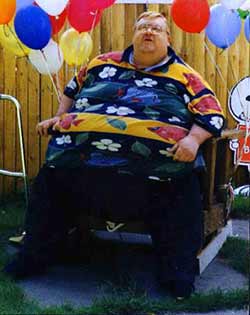|
Health in America

Mr David Mark Reid, a graduate of University of Chicago (M.A.) (USA), of Heidelberg University ( Germany) (M.Sc.), worked in different educational establishments in Turkey, Belarus, Colombia, Spain, Italy, South Korea, Ivory Coast, Iran, Germany, Zimbabwe, Australia. Now he is working as a teacher of English as a foreign language at Samara Nayanova University.
First, a point about language. In an older grammar book or dictionary, you may find the distinction: “people are healthy, food is healthful.” This distinction has been largely dropped in favor of “healthy” for both usages, and in the following, we shall follow this usage.
Americans wish to live healthily. However, they don’t know how. They are hindered1 from this by several factors:
1. Their science education is exceedingly2 poor. The requirements in the school are very low.
2. The public media are then managed by people who themselves have poor science education, and the advertisers who pay for television programming do not want programs that go above the head3 of any of its viewers.
 3. Advertisers take advantage of the poor education to sell unhealthy food, pretending that it is healthy. This is easier than selling healthy food, because unhealthy food is cheaper and tastier. Hence4, for example, Americans buy “fat-free” foods full of sugar and salt; the same people then do not understand why they get fat. Although there is an excellent law about listing the contents of foods on the package, relabeling is handy. Americans know what “sugar” is, but not “sucrose”; they know what “salt” is, but not “sodium chloride”. 3. Advertisers take advantage of the poor education to sell unhealthy food, pretending that it is healthy. This is easier than selling healthy food, because unhealthy food is cheaper and tastier. Hence4, for example, Americans buy “fat-free” foods full of sugar and salt; the same people then do not understand why they get fat. Although there is an excellent law about listing the contents of foods on the package, relabeling is handy. Americans know what “sugar” is, but not “sucrose”; they know what “salt” is, but not “sodium chloride”.
4. American life has been structured around the equation5: comfort = not moving. The car is used to go a few meters; you don’t have to get out of your car to order in a fast-food restaurant, or to do your banking, etc. (With Internet, this trend only accelerates.) This style of life has become so much assumed6 that it is not even put into question when the Americans decide to lose weight by exercise. Therefore, they might put in a little calisthenics7, and then drive the ten meters to their mailbox.
5. People are constantly told that, to properly lose weight, they should seek medical guidance. However, medical advice costs a lot of money. (This is partly caused by the national sport: suing8. Malpractice suits9 force doctors to buy expensive malpractice insurance, and this cost must come from the patients.) Therefore they prefer to read newspaper columns, and hence are subject to all sorts of silly10 and ineffectual fads11. Alternative medicine has had some notable successes — such as acupuncture — but this makes all sorts of other fringe12 theories to improperly claim legitimacy.
6. Being fat is no longer unusual in the US. Approximately half of all Americans are overweight, and about a quarter are obese. Therefore most Americans do not see anything bad in their extra flab13.
1hinder – мешать, препятствовать;
2exceedingly – весьма;
3go above the head – превышают уровень знаний;
4hence – (зд.) поэтому;
5equation – уравнение;
6assumed – свойственный;
7calisthenics – ритмическая гимнастика;
8suing – хождение по судам;
9malpractice suit – (амер.) иск о профессиональной небрежности;
10silly – глупый;
11fad – преходящее увлечение;
12fringe – выходящий за рамки общепринятого;
13flab – (разг.) вялые мускулы
Читать еще в этой рубрике:
Читать еще в этом номере:
|
|











